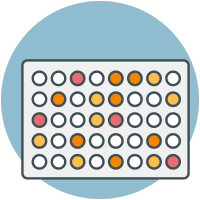Covalent Keymical Collections™
Covalent inhibitors have gained considerable interest among actors in chemical biology and drug discovery, not only as molecular probes but also in the development of active drug substances. These compounds show promise as modulators on otherwise unligandable targets, (e.g. KRASG12C). To advance chemical biology and discover new therapeutic solutions, we have expanded our renowned Keymical Collections™ with a novel covalent library – the Covalent Keymical Collections™. This unique library of 800+ compounds was designed from our diverse set of 3D-rich, NP-like small molecule scaffolds with a
set of 12 representative electrophilic warheads targeting 6 different amino acid residues (Cys, Lys, His, Tyr, Ser, and Thr).
All compounds in the Edelris Covalent Keymical Collections™ originate from our diverse, synthetically tractable, and Hit-to-Lead ready scaffold pool, thereby respecting current metrics for Lead-like compounds. Principal Moment of Inertia and Plane of Best Fit analyses of this unique Covalent Compound Collection demonstrates the library’s high 3D-character.
Let us unfold their potential as covalent binders when you have the chemical targets! Thanks to our unrivalled library and organic synthesis expertise and our mastery of handling a wide range of electrophilic warheads, we can efficiently deliver the searched-for covalent modulators to you.
EdelREADY: Ready-to-use screening plates
Bring Edelris’ decades of medicinal chemistry expertise directly into your in-house screening programs with EdelREADY screening plates. Fully customizable and pre-formatted in 384-well plates at 10mM in DMSO, and available with over 25,000 compounds from our Keymical Collections, EdelREADY provides flexible and easy access to our natural product-inspired, 3D-rich, synthetically tractable, and biologically relevant library.
- Assay-ready convenience in 384-well plates, pre-formatted in DMSO and shipped to your lab for rapid incorporation into your in-house screening programs.
- Escape the limitations of flatland chemistry with our topologically diverse and sp3-rich library, providing increased tractability and biological relevance.
- Direct access to a differentiated and diverse chemical matter, not available from other commercial screening libraries.
Keymical Fragments™
Edelris has developed a specific niche in the area of fragment collections based upon originality, synthetic tractability, topology (3D-shape), and growing ability, allowing for bio-relevant and efficient chemical space exploration. Other key design parameters include:
- Aqueous solubility of final compounds
- Easy synthetic access in 2-3 robust steps from standard building blocks
- Potential to grow fragments in different directions of space in case of hits
The fragments in our collections can be cherry-picked for greater flexibility when augmenting existing collections.
Keymical Collections™
The size of biologically relevant chemical space is conservatively estimated to be in the order of 1020 molecules. By comparison, all reported small molecules in public databases represent around 108 molecules, leaving this chemical universe virtually untapped.
Recent publications have proposed several potentially useful strategies for the synthesis of novel molecules aiming at the exploration of chemical space:
- Design of more sp3-enriched compounds in order to “Escape from Flatland”.
- Design and synthesis of compounds inspired by Natural Product
Natural by Design™: for over a decade, Edelris has pioneered the design and synthesis of innovative, Natural Product-like small molecules (Keymical Collections™), aiming at the discovery of bio-relevant chemical starting points towards hit and lead discovery.
DNA-encoded libraries
Rejuvenating combinatorial chemistry used in the 90’s, DNA-encoded libraries (DEL) has recently matured to a revolutionary hit-generation approach. The technology has allowed the design, synthesis, and screening of compound libraries of previously unthinkable size.
Edelris previously assembled an entire platform of fragments, synthons, and full-size compounds inspired from natural product topologies. We have recently developed the necessary chemistry to bring these novel scaffolds into the world of DEL, thus combining the power of DEL with the IP-enabling nature of our cores.
To this end, Edelris has designed and offers original, exclusive or non-exclusive bi-and tri-functional building blocks based upon its Keymical Space™. Edelris also offers fully elaborated DELs which can be tuned to customer requirements. The diversity infused by the introduction of Edelris’ DEL building blocks permeates through the entire combinatorial array, resulting in a highly leveraged set of novel products.

